- Clone
- 162.1 (See other available formats)
- Regulatory Status
- RUO
- Other Names
- CD2 like receptor activating cytotoxic cells, CD319, CS1, 19A24, SLAMF7
- Isotype
- Mouse IgG2b, κ
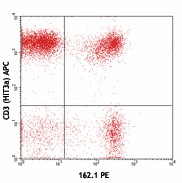
-

Human peripheral blood lymphocytes stained with CD3 (HIT3a) APC and 162.1 PE
| Cat # | Size | Price | Quantity Check Availability | ||
|---|---|---|---|---|---|
| 331806 | 100 tests | $292.00 | |||
CD319 is a single-pass type l transmembrane glycoprotein, expressed on NK cells, subsets of mature dendritic cells, activated B cells, and cytotoxic lymphocytes, but not in promyelocytic, B or T cell lines. Expression is highest in the spleen, lymph nodes, and peripheral blood leukocytes, and lowest in bone marrow. Additionally, it is expressed in the small intestine, stomach, appendix, lung, and trachea. CD319 is tyrosine phosphorylated in activated NK cells and is associated with 19 and 39 kD proteins. CD319 has homology with the CD2 family of receptors within the Ig superfamily. Some of the CD2 members stimulate cytotoxicity through the CD319 associated protein.
Product Details
- Verified Reactivity
- Human
- Reported Reactivity
- Cynomolgus
- Antibody Type
- Monoclonal
- Host Species
- Mouse
- Immunogen
- CRACC-Human IgG1 fusion protein
- Formulation
- Phosphate-buffered solution, pH 7.2, containing 0.09% sodium azide and BSA (origin USA)
- Preparation
- The antibody was purified by affinity chromatography, and conjugated with PE under optimal conditions.
- Concentration
- Lot-specific (to obtain lot-specific concentration and expiration, please enter the lot number in our Certificate of Analysis online tool.)
- Storage & Handling
- The antibody solution should be stored undiluted between 2°C and 8°C, and protected from prolonged exposure to light. Do not freeze.
- Application
-
FC - Quality tested
- Recommended Usage
-
Each lot of this antibody is quality control tested by immunofluorescent staining with flow cytometric analysis. For flow cytometric staining, the suggested use of this reagent is 5 µl per million cells in 100 µl staining volume or 5 µl per 100 µl of whole blood.
- Excitation Laser
-
Blue Laser (488 nm)
Green Laser (532 nm)/Yellow-Green Laser (561 nm)
-
Application References
(PubMed link indicates BioLegend citation) -
- Bouchon A, et al. 2001. J. Immunol. 167:551721.
- Tassi I and Colonna M. 2005. J. Immunol. 175:79968002.
- Veillette A. 2006. Immunol. Rev. 214:2234.
- Product Citations
-
- RRID
-
AB_2239190 (BioLegend Cat. No. 331806)
Antigen Details
- Structure
- Ig superfamily, 66 kD.
- Distribution
-
NK cells, subsets of mature dendritic cells, activated B cells, cytotoxic lymphocytes but not in promyelocytic, B or T cell lines.
- Function
- Regulates T cell and NK cell functions.
- Cell Type
- B cells, Dendritic cells, Lymphocytes, NK cells, Tregs
- Biology Area
- Immunology
- Molecular Family
- CD Molecules
- Antigen References
-
1. Bouchon A, et al. 2001. J. Immunol. 167:551721.
2. Tassi I and Colonna M. 2005. J. Immunol. 175:79968002.
3. Veillette A. 2006. Immunol. Rev. 214:2234. - Gene ID
- 57823 View all products for this Gene ID
- UniProt
- View information about CD319 on UniProt.org
Other Formats
View All CD319 Reagents Request Custom Conjugation| Description | Clone | Applications |
|---|---|---|
| Purified anti-human CD319 (CRACC) | 162.1 | FC,IP |
| PE anti-human CD319 (CRACC) | 162.1 | FC |
| PerCP/Cyanine5.5 anti-human CD319 (CRACC) | 162.1 | FC |
| APC anti-human CD319 (CRACC) | 162.1 | FC |
| PE/Dazzle™ 594 anti-human CD319 (CRACC) | 162.1 | FC |
| PE/Cyanine7 anti-human CD319 (CRACC) | 162.1 | FC |
| FITC anti-human CD319 (CRACC) | 162.1 | FC |
| Alexa Fluor® 647 anti-human CD319 (CRACC) | 162.1 | FC |
| TotalSeq™-A0830 anti-human CD319 (CRACC) | 162.1 | PG |
| TotalSeq™-C0830 anti-human CD319 (CRACC) | 162.1 | PG |
| TotalSeq™-B0830 anti-human CD319 (CRACC) | 162.1 | PG |
| PerCP/Fire™ 806 anti-human CD319 (CRACC) | 162.1 | FC |
Compare Data Across All Formats
This data display is provided for general comparisons between formats.
Your actual data may vary due to variations in samples, target cells, instruments and their settings, staining conditions, and other factors.
If you need assistance with selecting the best format contact our expert technical support team.
-
Purified anti-human CD319 (CRACC)
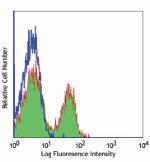
Human peripheral blood lymphocytes stained with purified 162... -
PE anti-human CD319 (CRACC)
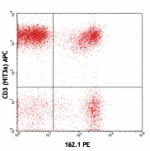
Human peripheral blood lymphocytes stained with CD3 (HIT3a) ... -
PerCP/Cyanine5.5 anti-human CD319 (CRACC)

Human peripheral blood lymphocytes were stained with CD3 FIT... -
APC anti-human CD319 (CRACC)
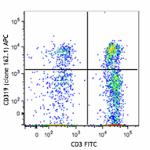
Human peripheral blood lymphocytes were stained with CD3 FIT... 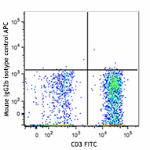
-
PE/Dazzle™ 594 anti-human CD319 (CRACC)
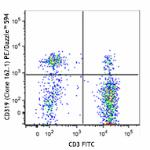
Human peripheral blood lymphocytes were stained with CD3 FIT... 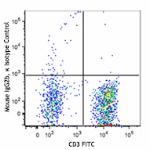
-
PE/Cyanine7 anti-human CD319 (CRACC)

Human peripheral blood lymphocytes were stained with CD3 FIT... -
FITC anti-human CD319 (CRACC)
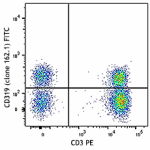
Human peripheral blood lymphocytes were stained with CD3 PE ... 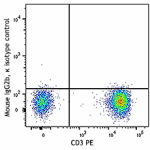
-
Alexa Fluor® 647 anti-human CD319 (CRACC)
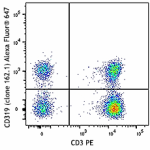
Human peripheral blood lymphocytes were stained with CD3 PE ... 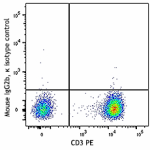
-
TotalSeq™-A0830 anti-human CD319 (CRACC)
-
TotalSeq™-C0830 anti-human CD319 (CRACC)
-
TotalSeq™-B0830 anti-human CD319 (CRACC)
-
PerCP/Fire™ 806 anti-human CD319 (CRACC)

Human peripheral blood lymphocytes were stained with anti-hu...
